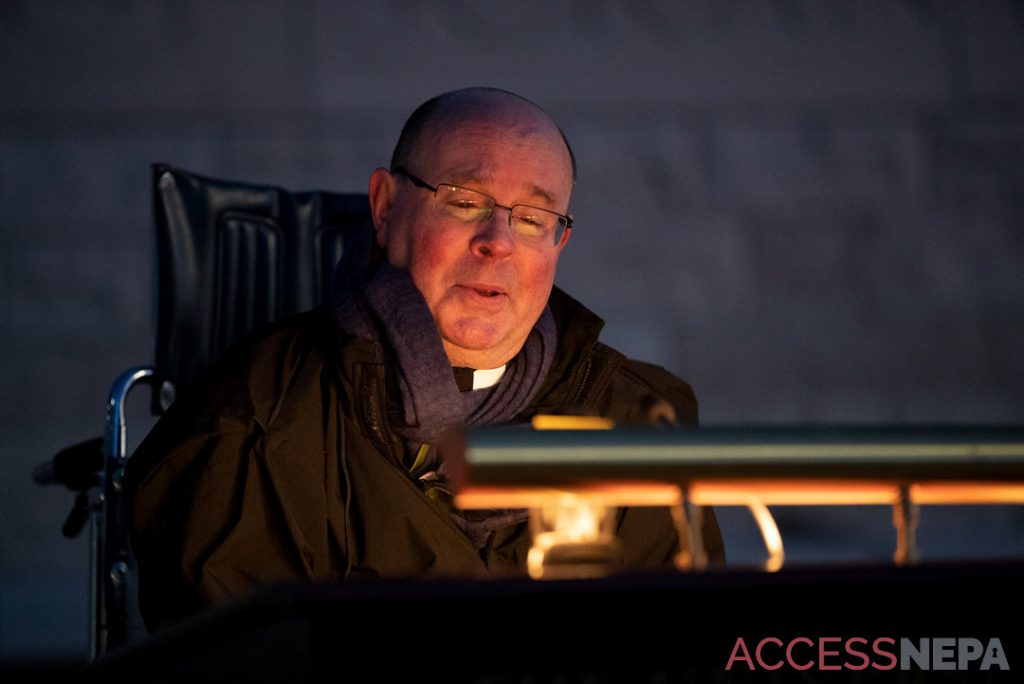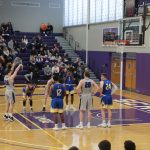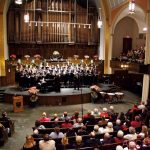Long before the coronavirus pandemic and his battle with a progressive nerve disease, the University of Scranton president added a quote to the exterior of the new campus center.
“Not where I breathe, but where I love, I live.”
The words from a 16th-century Jesuit poet captured the feelings of the Rev. Scott R. Pilarz, S.J., a decade ago and led him back to Scranton two years ago.
As he isolates from the rest of campus, the words take on greater meaning.
Pilarz relishes human connection and conversation. But, on a campus with 5,000 students, he must stay away from the people he feels called to serve.
As his symptoms from amyotrophic lateral sclerosis, known as ALS or Lou Gehrig’s disease, progress, he looks at coronavirus testing data and trends on campus. He makes decisions on whether in-person instruction should continue, and questions what the spring semester will look like.
“The longer the virus is here, it will become a permanent part of who we are and how we educate students,” Pilarz said. “What we once knew was normal a year ago, I don’t know if we’ll ever get back. … We’re making decisions I never in my lifetime thought we’d make.”
While he leads the university through the pandemic, the greatest challenge of his career, his own battle continues.
Pilarz announced in August that because of the disease’s progression, this academic year would be his last as president. While the university has directed students to stay apart, the community has come together to support the Jesuit leader.
“I get choked up talking about it. It’s been remarkable,” Pilarz said. “I can’t find ways to describe it. It’s part of the uniqueness of this place.”
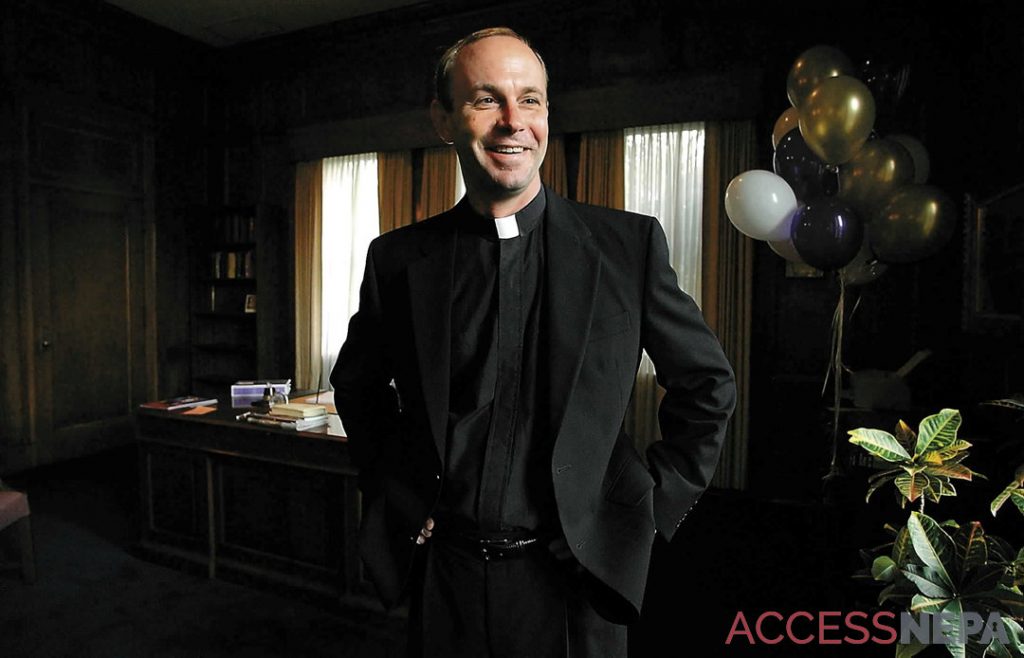
ACCESS NEPA FILENew University of Scranton President The Rev. Scott Pilarz smiles in his new office in July 2003.
Coming home
Pilarz, 61, once envisioned himself as a senator from New Jersey, but that changed as a student at Georgetown University. He saw the Jesuits lead happy and fulfilled lives, and the faith-filled student began to join service projects and went on retreats. Seeing service and faith as part of daily life inspired him to enter the Society of Jesus in 1981.
Before the completion of the DeNaples Center in 2008, he requested the quote — “Not where I breathe, but where I love, I live.” — from Jesuit poet Robert Southwell be etched on an exterior wall.
He left in 2011, and in the seven years he was gone — to serve as president of Marquette University and Georgetown Preparatory School — those words haunted him. He wanted to come home.
News of his return had some alumni and employees jokingly call it the “second coming of Pilarz.” Soon, a new cohort of students would learn why Pilarz was beloved by alumni and staff who knew his legacy.
Pilarz announced his diagnosis of ALS in August 2018, just a few weeks before his second inauguration. Earlier that year, he began to experience weakness in his hands and arms and loss of grip. He saw specialists and began therapies.
The disease affects nerve cells in the brain and the spinal cord, weakening muscles and affecting physical function. There is no cure.
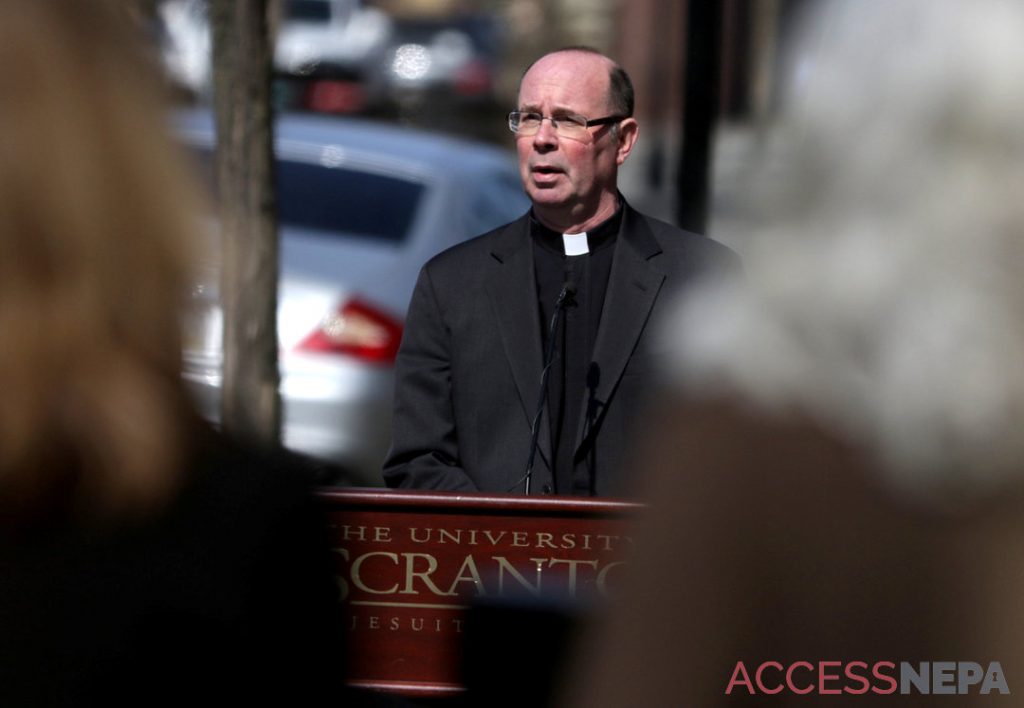
ACCESS NEPA FILE
The Rev. Scott R. Pilarz, S.J., president of the University of Scranton, speaks during the opening ceremony of the Autism Collaborative Centers of Excellence Executive Hub in 2018.
Tracking the virus
After the University of Scranton and other schools closed in March, Pilarz and other leaders immediately began to plan ways to bring students back to campus safely.
When students returned in August, the campus began the most comprehensive testing effort locally. Students receive alerts to be tested at the Long Center, even without any symptoms. In the last 12 weeks, the college conducted 11,215 tests on students and employees, finding a 3.66% positivity rate. Some people criticized the university for adding more than 400 cases, many of them asymptomatic, to Lackawanna County totals. Pilarz said the school needs to conduct the testing to keep everyone safe.
“I’ve never seen anyone on campus without a mask on. It’s really impressive,” Pilarz said. “They know they’re doing it for each other and the good of the university community. I’m really happy.”
Pilarz knows some university vice presidents have delivered meals to students in isolation, and applauds the “staff on the front lines” for keeping common spaces clean. He worries about freshmen feeling isolated and seniors missing out on rituals. He hopes in the end, the unique experience helps create lasting bonds.
In recent weeks, the university stressed the importance for students to be vigilant leading up to the Thanksgiving break, which will be the end of the fall semester.
“We don’t want anything happening to their parents or grandparents. It’s not time to let up,” Pilarz said. “I believe the campus, even though there are fewer masses, fewer retreats, fewer opportunities for service, this time has called us together in a more reflective, spiritual way. We are lucky we have the Catholic, Jesuit resources to call on in these uncertain times.”
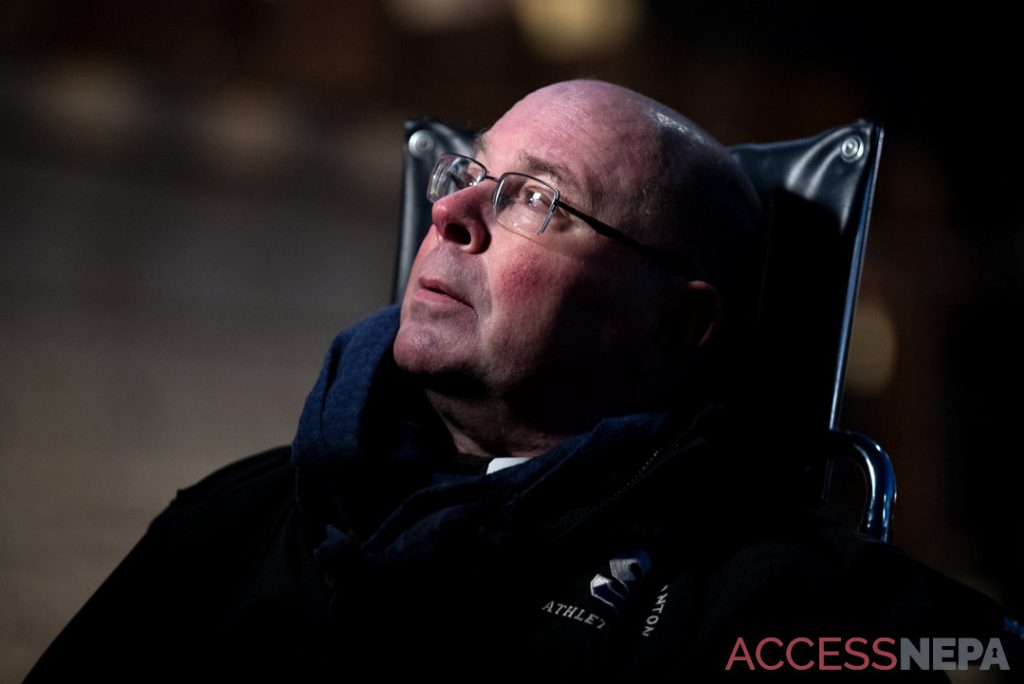
ACCESS NEPA FILE
University of Scranton President the Rev. Scott R. Pilarz, S.J., attends a dedication ceremony in February 2020 for the St. Thomas Gateway at Linden Street on campus.
Staying safe
ALS eventually affects a person’s ability to breathe. Doctors cautioned Pilarz that catching the coronavirus could have devastating consequences.
Pilarz hasn’t visited his office in Scranton Hall since March. Loneliness is a rare feeling for a college president.
He lives in Condron Hall, a sophomore residence, to help connect with students. As a president, his schedule should include in-person meetings with potential donors, coffee dates with vice presidents and time to attend activities on campus.
The university is in the midst of launching a new capital campaign, not to raise money for new buildings like in the past, but to support scholarships and financial aid to help a college education become more affordable. Through the pandemic, Pilarz credits the university for operating without dipping into reserves, and for not needing to furlough employees. The number of donors has actually increased since the pandemic began. The President’s Business Council black tie gala, held each fall in New York City, went virtual this year, and raised $900,000 — comparable to traditional events in the past.
Beyond his fundraising abilities or leadership style, colleagues say Pilarz inspires those around him to embody Jesuit values and put others before themselves.
When Pilarz announced his diagnosis two years ago and his retirement this year, students hung signs in their residence hall windows. Bumper stickers with the 16th century Southwell quote etched on the DeNaples Center appeared on 21st century cars. Staff extended support to Pilarz’s parents, who moved to the region from New Jersey after his diagnosis.
Until the early fall, Pilarz could not see his parents at their senior living center because of the pandemic. University staff regularly dropped off food, books and other items.
“We are a community. He is so well-respected and beloved,” said Patricia Tetreault, the university’s vice president for human resources. “People really, truly care about him, because they know he cares about them.”
While Pilarz deals with his own health challenges, he remains devoted to being a strong administrator and pastoral presence, said Jeffrey Gingerich, Ph.D., provost and senior vice president of academic affairs.
“No one has been trained to be a president in a time like this,” he said. “We’re bracing ourselves for what it will be like for him to not be the leader on campus.”
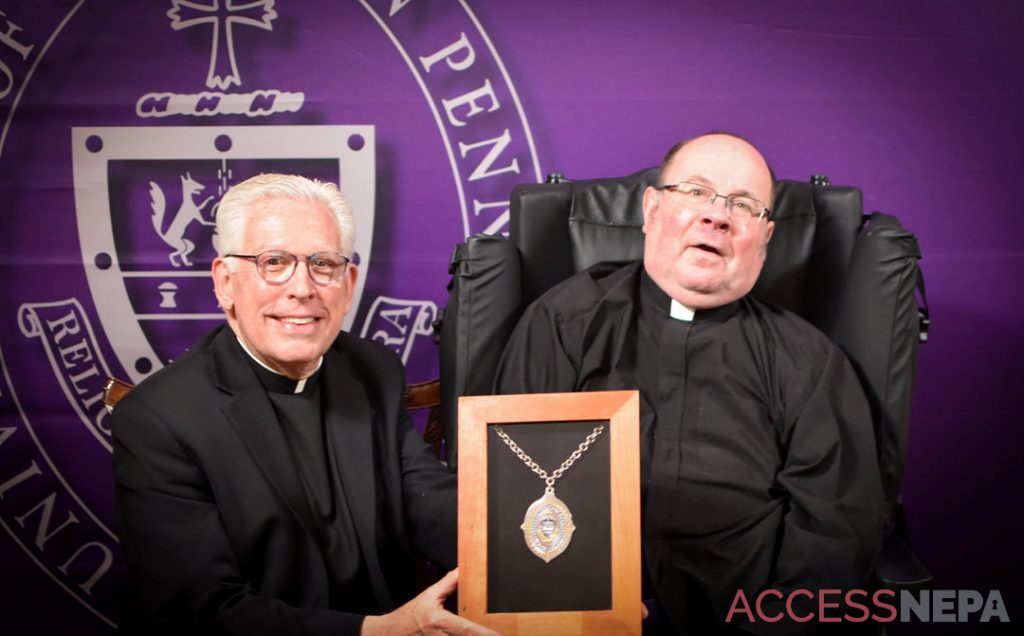
ACCESS NEPA FILE
Monsignor Joseph G. Quinn, left, is presented the University of Scranton’s 2020 President’s Medal by university President the Rev. Scott R. Pilarz, S.J., in September.
Looking forward
Unable to take more than a few steps at a time, Pilarz must use a wheelchair. The progression of the disease remains slow.
“It’s almost to the point you don’t notice it for awhile, but then you realize you need to change how you do something,” he said.
Last month, he received an unexpected Zoom call he first thought was a prank. Former President Bill Clinton, a fellow Georgetown graduate, had two questions: What is it like being a college president right now? And, how are you doing with your ALS diagnosis?
Clinton had seen the video of Pilarz announcing his retirement and had been touched by it, Pilarz said.
“I talked to him about the sense of community here that is second to none,” he said. “We were on the phone for 45 minutes. … I wondered if it was a new form of Candid Camera. It was amazing.”
After Pilarz retires in May, he hopes to become an advocate for ALS research and patients and has started to speak to organizations on how he could be most helpful.
While there is no cure for ALS, he began a new treatment through Massachusetts General Hospital in October.
“There are no promises, but it’s hope. People living with ALS may need that more than anything,” Pilarz said. “I’ve never felt as much support as I feel now. That carries me.”

Sarah balances life as a reporter for The Times-Tribune and as the mom of two little girls. A graduate of Ithaca College, Sarah started covering education in 2006. She has received awards for her reporting from the Society of Professional Journalists, Pennsylvania Newsmedia Association, Inland Press Association and Pennsylvania Women’s Press Association. She lives in Clarks Summit with her husband, their daughters and their sweet pug, Sadie. Reach her at shofius@timesshamrock.com, 570-348-9133 or @HofiusHallTT.

